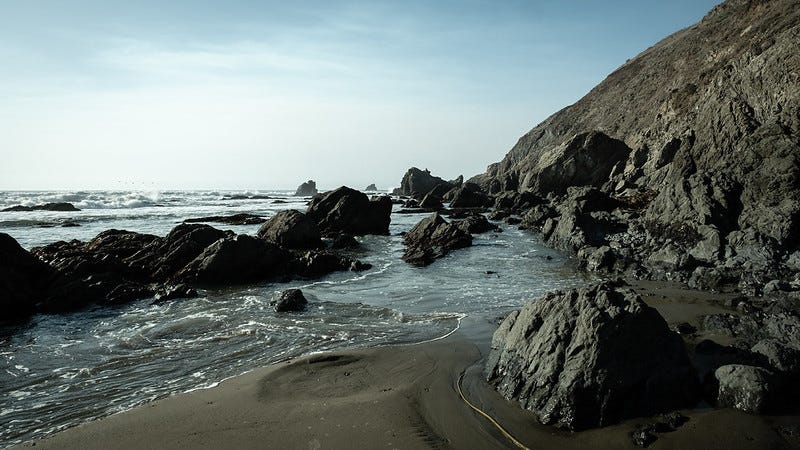California Coastal Commission Cites Irish Beach Improvement Club for Unpermitted Development
Says public access predates creation of the subdivision
This story was jointly reported by Elise Cox and Karen Elowitt and appears in today’s issue of the Independent Coast Observer.
Irish Beach, a coastal subdivision in southern Mendocino County, is home to a mix of vacation houses and year-round residences perched on ocean bluffs with expansive views of the Pacific. For decades, the community has promoted its private beach access road as a key amenity.
But last month, that road became the center of an acrimonious dispute. According to California Coastal Commission staff, public access along the road to the beach predates the creation of subdivision. The issue was raised during the permitting process and, the commission asserts, public access continued until an unpermitted gate was erected to block it.
On October 23, 2025, the California Coastal Commission issued a Notice of Violation to the Irish Beach Improvement Club and three property owners whose land contains the road through longstanding easements. The immediate issue is unpermitted development. The underlying issue is public access to the road and the beach.
The Irish Beach Improvement Club — a voluntary homeowners association — maintains the road and the easement areas. Its work has included installing asphalt and a retaining wall, adding a solar-powered gate system and new signs, reinstalling traffic spikes, grading the beach to expand a parking area, and removing vegetation.
The problem: none of the work was permitted. Those improvements now threaten to cost the community millions of dollars in coastal commission penalties.
“Members of the public have reported, and commission staff has confirmed, that development has occurred on the above-described properties without the required CDP, constituting ‘unpermitted development’ and a violation of the Coastal Act and LCP,” the notice states, referring to a coastal development permit and Mendocino County’s Local Coastal Program.
The commission also asserts that the new gate and signage on Upper Beach Drive, along with signage and traffic spikes on Lower Beach Drive, restrict public access. “Furthermore, it appears that restrictions to public access have been installed and maintained in this area for many years,” the notice states.
Emily Thorne, president of the Irish Beach Improvement Club board, declined to comment ahead of the club’s November 22 meeting. In a private Facebook post to members, she said the board had met and developed an action plan. “We want to assure all members that the organization is fully prepared to address these matters in a timely and cooperative manner,” she wrote.
Thorne added that the electric gate on Beach Road must remain open. “Although the coastal commission was informed that Beach Road is a private road and that a gate has been in place since the development of the community, they are requiring proof of this,” she wrote.
Under the Coastal Act, the commission may impose penalties of up to $30,000 per violation and up to $11,250 per day for obstructing public access. The violations cited in the notice allegedly occurred between March 4, 2016, and March 4, 2019. The notice also emphasizes that the list of violations is not exhaustive.
In addition to the Improvement Club, the notice was sent to the three property owners affected by the road. Although the violations relate to activities “overseen by [the Irish Beach Improvement Club],” the commission notes that “violations run with the land, and each individual property owner here is also liable for violations on their property.”
One of the owners, Mark Rapelje, said the experience has pushed him to abandon the idea of building a home on the lot he purchased 27 years ago. “It took us five years to get a coastal development permit,” he said in an interview. He described facing opposition from the club and then losing a mortgage guarantee when the Great Recession hit. Rapelje said he reported the unpermitted development by the club on his land years ago — first to the county, then to the coastal commission.
He added that although his deed identifies the easement road as private, he has found documents suggesting the developers agreed to provide public access to the road and the beach it leads to. He believes that agreement lowers the value of his property, which he now hopes to sell, ideally to a conservation group.
To resolve the violations, the commission is requiring the Irish Beach Improvement Club and the property owners to submit a report by December 4, 2025, identifying all areas affected by the unpermitted development and including a forensic biological assessment by a licensed biologist. They must also submit a complete coastal development permit application for the corrective work by December 18, 2025.



